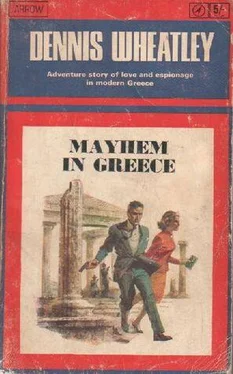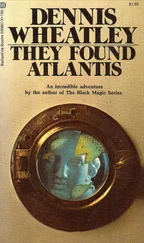While employed on these jobs, he covertly kept an eye on all the customers who came to the agency, and listened to their conversation with his colleagues. Very few of them were people of substance seeking accommodation in good hotels or expensive travel outside Greece. Once or twice a day men, some of whom looked rather seedy, came in, asked for Krajcir and, evidently being known at the office, were shown straight in to him. But the great majority were men and women on holiday from Czechoslovakia. They were all good Communists who, as a reward for showing an enthusiastic Party spirit, had been nominated by their bosses for a fortnight's cruise in the eastern Mediterranean, and were in Athens only for a couple of nights. Far from being customers wanting to hire cars or private guides, they had barely enough money to buy themselves a drink, and came in only to collect folders, with pictures of the places to which they had been, to take home with them.
After working in the agency for a few days, Robbie began to wonder how, with such a clientele, it could possibly pay its way. The answer, he decided, was that it didn't and must be run as part of a propaganda programme. But, listen as he did with commendable patience, not one word did he hear exchanged between the members of the staff, or between them and anyone who came to the agency, that had any connexion with oil or tobacco.
Unaccustomed as he was to being ordered about, and loathing as he did routine tasks, by the end of the week Robbie was thoroughly fed up and felt that he could not stick it a day longer. On the Friday, when Krajcir doled out to him his meagre pay, he actually had it on the tip of his tongue to give notice, but at that moment a telephone call came through for the manager; so Robbie had to leave his room and, on second thoughts, he decided to put off taking the irrevocable step till after the weekend.
His reason for postponing the issue was his suddenly remembering that Luke Beecham would be back in Athens next day. On the previous Monday evening, after his first day at the agency, Robbie had called at Luke's flat to tell him about his job, only to learn that, after spending the week-end in the villa that belonged to friends and looked out on Lavrion's sunny beach, Luke had left for one of his periodic spells at his Company's office in Salonika and would not be returning till Saturday. Although Robbie was now convinced that he was wasting his time at the agency, he still felt considerable qualms about abandoning his quest altogether and possibly incurring the anger of Pallas Athene. During the week, no other idea for continuing it in a new direction had come to him, but there was just a chance that Luke might produce one; so, when eight o'clock came, he said good night to his colleagues as usual, and walked round the corner to the Grande Bretagne.
The long siesta break, from midday until four in the afternoon, observed in most offices in Athens, had to be made up by a four-hour working session morning and evening. Robbie, being unaccustomed to such lengthy days of activity, had found in the past week that, after dining, he had been too tired to go to the last house at any of the cinemas. But after going early to bed on the first two nights his mind, having nothing new to think about, had once more become largely occupied with his,book. In consequence, on Wednesday and Thursday evenings, instead of going straight to bed, he had got into a dressing gown and had worked for an hour or two on a new, chapter. It was the story of another of the Heroes, and by eleven o'clock on this Friday night, he finished it. Laying down his pen with a sigh of satisfaction, he sat back and read over what he had written:
THE HEROES (no. 2 perseus)
Once upon a time, there was a King of Argos named Acrisius. Like most of the ancient Greeks he was terribly keen about having his fortune told, so he consulted an Oracle. Afterwards he wished he hadn't, because he was told that he would die by the hand of his grandson. This worried him a lot; but he had only one child, an unmarried daughter named Danae, and he thought he might manage to cheat Fate by locking her up so that no man could get at her, because then he wouldn't have any grandchildren.
So determined was he to keep Danae a virgin that he was not content to put her in an ordinary prison, in case some stalwart youth came along with a pick-axe and hacked a way to her through the wall. For the job, he built a tower of brass and shut the poor girl up in that. But the one thing he could not do was to turn Danae from a most lovely girl into an unattractive frump, and it was that which led to his going to all this trouble for nothing.
Zeus happened to come coasting along on a cloud with nothing much to do, and looking down he saw Danae. The gentle reader will guess what happened then. In the twinkling of an eye the old rip had turned himself into a shower of gold and streaked down through the top of the brass tower. From her attitude to life later it seems that Danae thoroughly enjoyed what happened after that. Anyhow, the next time her father visited her he found to his dismay that she was in the family way, and too far gone for him to do anything about it.
The child to whom she gave birth was Perseus. When King Acrisius learned that she had had a boy he was so scared for himself that he thought of killing the child, but he just could not get up enough courage to have such blood-guilt on his hands.
c 61
As the next best bet for yet avoiding the Fate decreed for him, he had the mother and her infant put in a wooden chest and the chest thrown into the sea, hoping that they would both drown or be dashed to pieces on a rocky shore.
Whatever one may think of Zeus's morals, he always did his best to look after girls who had given him a good time; so he got in touch with his brother Poseidon and asked him to do the necessary. The Sea King obliged by stilling the wind and waves and gently pushed the chest ashore on the island of Seriphos in the Aegean.
There Danae and her infant were found by a fisherman named Dictys. He was a good man and took them to his house, where he brought Perseus up as his own child. As Perseus grew up he so greatly outshone in strength, agility and beauty all the other youngsters on the island that it became pretty clear to everyone that he must be the son of a god, and they willingly made him their leader.
But trouble was brewing. Dictys had a brother named Polydectes, who was chief of the island, and after a while he began to make passes at the beautiful Danae. She proved very smell-face about this, and said that having had Zeus for a lover she was not prepared to play those sort of games with any mere mortal. Perseus was very devoted to his mother and by then old enough to defend her. He said in no uncertain manner that if Polydectes laid a finger on her he'd sock him for six.
Feeling that he would stand a better chance with Danae if he could get this tiresome young man out of the way, Polydectes ordered Perseus to go and slay a terrible monster called Medusa. Why Perseus, having defied Polydectes over the question of his mother, should have felt compelled to obey this order is by no means clear. But apparently Athene had been sending him dreams in which he saw himself as the equivalent in those days of a film star. Convinced that he could count on the backing of the goddess, he would have been a pretty poor fish if he hadn't been tempted to go off and do something spectacular, so as to be feted and admired by all. Anyhow, he seems to have persuaded himself that his mother was quite capable of taking care of herself during his absence, and declared himself willing to go and put paid to Medusa.
When the news of this reached Olympus the gods became a bit worried, as they feared he might be biting off more than he could chew. Medusa was one of the three Gorgon sisters and the only one who was mortal, but she packed a weapon not much less deadly than an atom bomb. When young she had been rude to Athene, so the goddess had turned her hair into vipers and made her face so horrible that whoever she looked at was instantly turned to stone.
Читать дальше












